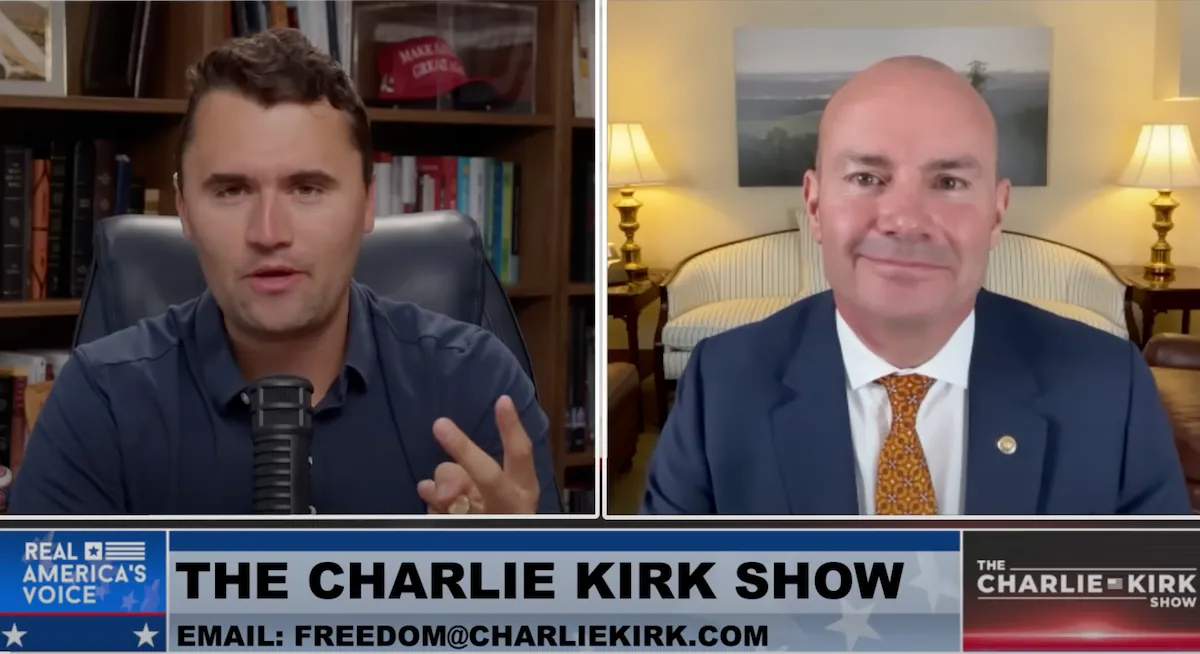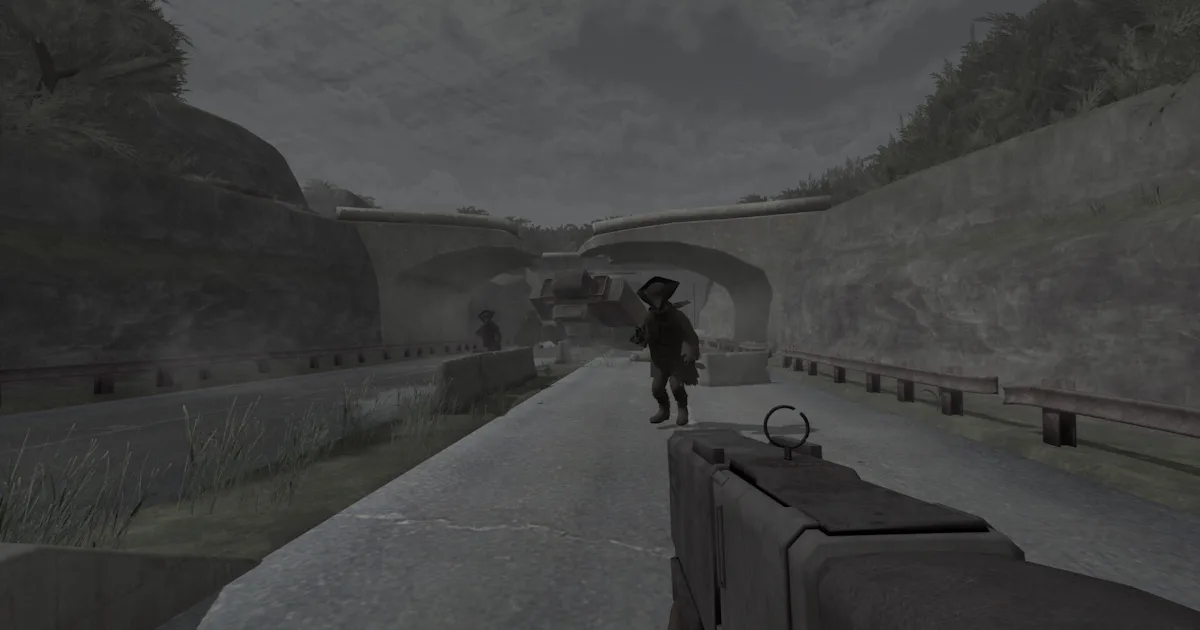
One week before fellow conservative Charlie Kirk was shot and killed on a college campus in Utah, the state’s U.S. Sen. Mike Lee thanked him for planning multiple appearances in the Beehive State.
“You’ve been on the front lines defending free speech, especially where it’s been most under pressure, as it has been on college campuses all over the country,” Lee said while a guest on “The Charlie Kirk Show” on Sept. 3.
“And I’m so glad that you’re bringing that fight to Utah State University and Utah Valley University next week,” Lee added.
On the afternoon of Sept. 10, the day of Kirk’s death, Lee shared his condolences in a video posted to X, with the caption, “My heart is heavy.” The next day, the senator announced he was introducing a resolution condemning Kirk’s killing and “honoring his life and legacy.”
Over the course of the 10-minute segment earlier this month, the pair talked about Kirk’s scheduled Utah visits, a judge ordering the state Legislature to adopt new congressional maps as part of a redistricting lawsuit and Health Secretary Robert F. Kennedy Jr.’s firing of Centers for Disease Control and Prevention Director Susan Monarez just 29 days into her job.
A 2023 analysis by the nonprofit public policy think tank Brookings Institution found that Kirk’s show contained the second largest amount of misinformation among political podcasts, following only former White House strategist Steve Bannon’s “War Room.”
In his own appearance on the show, Lee described Republican-appointed and confirmed Utah judges as “leftist allies” as he criticized rulings that have so far culminated in congressional maps drawn by the supermajority GOP Legislature being throw out.
Then, addressing a portion of a decision that rejected the Legislature’s replacement of a voter-passed ballot initiative to ban political gerrymandering and require maps be drawn by an independent commission, Lee said, “Nothing in the Utah Constitution compels or even allows that result.”
Courts have repeatedly cited Article 1 Section 2 of the Utah Constitution in their rulings, which says, people “have the right to alter or reform their government as the public welfare may require.”
This interview has been lightly edited for clarity.
Charlie Kirk: Joining us now is a great friend and amazing person, Sen. Mike Lee from the wonderful state of Utah. Sen. Lee, great to see you.
Senator, I am going to Utah next week, a week from today, at the wonderful Utah Valley University. All are welcome. You guys can get your tickets at AmericanComebackTour.com.
Sen. Lee, this is already making a lot of headlines. People are very angry. They’re calling for my cancellation. They think our permit should be pulled. This is a greater response than when I go to University of California, Berkeley. Sen. Lee, what is going on in the beautiful state of Utah?
Sen. Mikee Lee: Well, first of all, Charlie, I want to thank you for the work that you’re doing on campuses across the country, and for your interest in visiting Utah next week. You’re giving students everywhere the chance to hear perspectives that they often wouldn’t otherwise get. You’ve been on the front lines defending free speech, especially where it’s been most under pressure, as it has been on college campuses all over the country. And I’m so glad that you’re bringing that fight to Utah State University and Utah Valley University next week.
Look, free speech shouldn’t stop at the campus gates. If anything, we should have a heightened degree of attention and focus, a heightened degree of protectiveness around free speech on campuses, because the learning environment necessarily requires open, honest conversations where different viewpoints are examined. Our students deserve open discussion and vigorous debate, and not just the same sanitized woke version that so many college administrators and faculty members seem to prefer and seem to demand exclusively.
Utahns believe in open debate and free exchange of ideas. What you’re doing helps to ensure students get that experience, because if students can’t handle diverse ideas in college, how are they ever going to handle that in real life?
I hope and expect that your visit to Utah will be productive, that you will be able to speak, they’re not going to exclude you. And I anticipate that once you’re there, a lot of the naysayers, a lot of those people trying to exclude you, are going to see some real utility behind your visit there. Who knows why they decide to start these things. But each time they start them, and then you show up and do what you do best, people are enlightened as a result of it. So thank you for doing that.
Kirk: Well, it’s going to be fun. And I think some of these people that are getting very angry are going to be very disappointed, because I am the same person on this program that I am there on campus. And if you disagree, go to the front of the line and we’re going to have a good chat. It’s AmericanComebackTour.com.
Lee: When you show up, and they see that you walk upright, and have opposable thumbs, I think some of them are going to feel a little bit silly after the big to-do they’ve made of it.
Kirk: That’s well-said. And thank you, senator.
Senator, I want to shift gears here to President Trump’s Truth Social. He said, “Monday’s court order in Utah is absolutely unconstitutional. How does such a wonderful Republican state like Utah, which I won every election, end up with so many radical left judges?”
Senator, what is going on here? Please take some time and go into some detail and explain what’s happening in the great state of Utah.
Lee: Yeah, so Utah’s electoral system is under attack by Democrats, including their leftist allies in the Utah courts.
About seven years ago, there was an effort through which Utah voters passed a law through a ballot initiative, creating a legislative redistricting commission. Now, in the years that followed, the Utah Legislature subsequently amended that law, which it has the power to do under the Utah Constitution. In other words, you can make a law either through the Legislature or through a ballot initiative. The power is somewhat rarely used, but when it is used, it runs on a parallel track with laws made by the Legislature, so that the Legislature can subsequently amend or even repeal a law that was previously made under our state constitution through a ballot initiative.
But Utah courts are now invalidating the Legislature’s amendments to that earlier ballot initiative and to Utah’s existing congressional district maps, even though nothing in the Utah Constitution compels or even allows that result. And even though one provision in particular, Article 9 of the Utah Constitution, actually requires legislative districts, including congressional districts, to be drawn by the Legislature — not by some nameless, faceless commission consisting of people who, as well-educated and well-intentioned as they might be, have never been elected by anybody and don’t serve accountable to the voters of Utah.
So, it now appears that Utah is likely to be bound by a process involving congressional district maps being drawn not by the Legislature, but by this outside commission. And although the Legislature still has final authority to approve any such maps under the court order that came out last week, the maps, one way or another, have to be more or less drawn by the commission, even though that constitutionally belongs to the Legislature.
Look, this is great for Utah’s Democrats who haven’t controlled the Utah Legislature in many, many decades — not because Utah voters are ignorant, but because they don’t like what the Democratic Party is selling, and haven’t for decades. That’s why we have Republican supermajority margins in the Utah House and in the Senate, and why we’ve controlled the governor’s office for decades. But now with this, they found a clever way to even the score, by enlisting the help of their judicial allies.
This is a terrible development for the rule of law, for voters in Utah who deserve to have these decisions made in a manner consistent with the U.S. Constitution and the Utah Constitution. And make no mistake, this decision, while being heralded by the left because they like it, because it’s a victory, these are cheap points they’re scoring — this will make the process of drawing legislative districts in Utah less accountable to the voters, not more. Because that’s what happens when you take that constitutional responsibility away from elected lawmakers and you give it to someone else.
It’ll also result in maps that are far more generous to Democrats. And I think that’s the whole point — is that they hope to pick up at least one seat, maybe two, for Democrats in Utah as a result of this. So it’s kind of a judicial takeover of the political process, one that’s designed by leftists to advance the electoral prospects of the Democratic Party in Utah. And it’s yet another example of how these independent commissions are so often used by the left to give an unfair, unearned advantage to Democrats in red states — one that they could never otherwise secure through the electoral process.
Kirk: So this is part of a broader redistricting fight in California and Texas. Let me ask this, why is Utah seemingly having this Democrat-appeasing moderate streak? Let’s just talk more broadly about Utah. You’re a constitutional conservative, Sen. Lee, and one of the best, if not the best, in the nation. And you have an amazing track record. And you’re so good to your constituents, and you represent your voters. Why is it that in Utah, which is supposed to be this solidly red state, why give any ground at all whatsoever? What are the influences that are seeping into Utah that seem to be changing the politic there?
Lee: Perhaps first and foremost, I think we’ve gotten a little complacent with the fact that we’ve had these Republican majorities in both houses of our Legislature, and the governor’s office, and so many of our other prominent elected positions in the state. The fact that we’ve had those under the Republican banner for as many decades as we have has perhaps caused many in the state to not be aware of what’s going on, because you have to dig into some of these details to see what’s going on when something like this happens.
Then you add to that, Charlie, what happens in a state like mine — a Republican state, consistently Republican state — that has no conservative media to speak of. You know, we’ve got a handful here or there. We’ve got a handful of great people on the radio, for example. But as far as our print media, and our mainstream broadcast media — TV and radio — within the state, we have no significant, large-scale conservative, or even right-of-center media within Utah. It’s a pretty mismatched state in terms of the political views of the constituency, the citizenry of Utah, and the disparity between that and the news media establishment. That doesn’t help.
But here again, just with the apathy problem or the lack of awareness problem, the more people talk about this, the more we can draw attention to it. I think we can remedy some of that defect. And I think what you’re doing with your visit to Utah next week, which I applaud, helps to shed light on these things and helps to raise awareness of what’s actually happening.
Kirk: Senator, in closing here, I want you to comment on the CDC situation. Senate Republicans express alarm over CDC director’s firing. I can’t imagine that you share that view, but if you do, I’d love to hear, because I trust your opinion. What is your opinion on what’s happening at the CDC right now?
Lee: Look, my copy of the Constitution says that the executive power of the U.S. government is vested in the president. Now, for that to mean anything, for the Constitution to hold up, for the separation of powers generally to be respected — including the element of separation of powers that’s found within Article 2, which governs the executive branch and the president — for those things to mean anything, the president, as the head of the executive branch, necessarily must have the authority to hire and fire subordinates.
Some of those subordinate officers require Senate confirmation when he hires them but there’s no comparable restriction on congressional authorization to fire them, nor should there be. By statute, Congress has, over time, unwisely, and I believe unconstitutionally, limited the president’s firing authority to these for-cause circumstances, or through a career civil servant protection, or otherwise.
And that’s wrong. The executive power is lodged in the president. It needs to stay there. And if the CDC director or HHS bureaucrat ignores the president, they have to be held accountable by the president.



